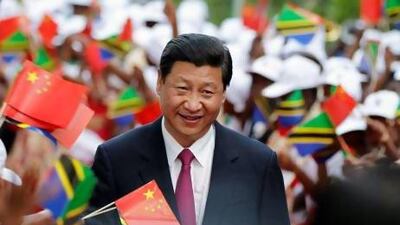DAR ES SALAAM // China's president told Africans yesterday he wanted a relationship of equals that would help the continent develop, responding to concerns that Beijing is only interested in shipping out its raw materials.
On the first stop on an African tour that will include a BRICS summit of major emerging economies, Xi Jinping told the Tanzanian president, Jakaya Kikwete, that China's involvement in Africa would help the continent grow richer.
"China sincerely hopes to see faster development in African countries and a better life for African people," Mr Xi said in a speech laying out China's policy on Africa, delivered at a conference centre in Dar es Salaam built with Chinese money.
Renewing an offer of US$20 billion (Dh73.4bn) of loans to Africa between 2013 and 2015, Mr Xi pledged to "help African countries turn resource endowment into development strength and achieve independent and sustainable development".
Africans broadly see China as a healthy counterbalance to Western influence but, as ties mature, there are growing calls from policymakers and economists for a more balanced trade deal.
"China will continue to offer, as always, necessary assistance to Africa with no political strings attached," Mr Xi said to applause. "We get on well and treat each others as equals."
But gratitude for that aid is increasingly tinged with resentment about the way Chinese companies operate in Africa, where industrial complexes staffed exclusively by Chinese workers have occasionally provoked riots by locals looking for work.
Countering concerns that Africa is not benefiting from developing skills or technology from Chinese investment, Mr Xi said China would train 30,000 African professionals, offer 18,000 scholarships to African students and "increase technology transfer and experience".
"The Sino-Tanzania relationship has endured a lot," said Mr Kikwete, whose nation built close ties with China in the early years after independence from the British in 1964. "Now we have become all-weather friends."
China built a railway linking Tanzania and Zambia in the 1960s and early 1970s.
The two leaders witnessed the signing of trade and other deals, including plans to co-develop a new port and industrial zone complex, a loan for communications infrastructure and an interest-free loan to the government. No details were given on the size of the loans or the industrial projects.
Mr Xi's next stop was South Africa for a BRICS summit today and tomorrow, where he could endorse plans for a joint foreign exchange reserves pool and an infrastructure bank.
Those proposals respond to frustrations among emerging markets at having to rely on the World Bank and International Monetary Fund, which are seen as reflecting the interests of the United States and other industrialised nations.
Nigeria's central bank governor, Lamido Sanusi, wrote in the Financial Times this month that the trade imbalance between China and Africa was "the essence of colonialism" and cautioned the continent was vulnerable to a new form of imperialism.
China is keen not to be perceived as an imperial master.
"The legacy of [the] West is the feeling that Africa should thank them, and that Africa should recognise that it is not as good as the West," Zhong Jianhua, China's special envoy to Africa, said before Mr Xi's trip. "That is not acceptable."
Lu Shaye, head of the Chinese Foreign Ministry's African affairs department, said it was the West which was only interested in African resources, not China.
"What have western countries done for Africa in the 50 years since independence? Nothing. All they have done is criticise China and that is unfair," he told a Hong Kong television station.
Mr Xi's African tour ends in Republic of Congo, from which China imported 5.4 billion tonnes of oil last year. That amount was just 2 per cent of its total oil imports, but potentially the source of a lot more.

